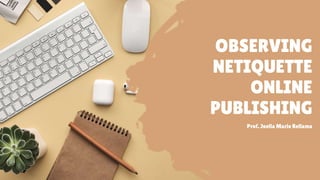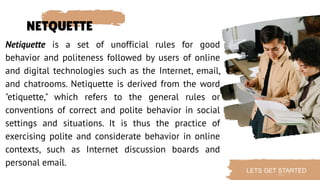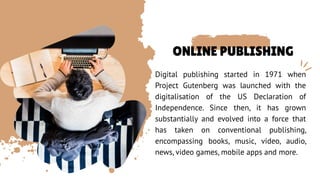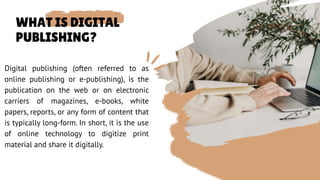Observing Netiquette Online Publishing.pptx
- 2. NETQUETTE Netiquette is a set of unofficial rules for good behavior and politeness followed by users of online and digital technologies such as the Internet, email, and chatrooms. Netiquette is derived from the word "etiquette," which refers to the general rules or conventions of correct and polite behavior in social settings and situations. It is thus the practice of exercising polite and considerate behavior in online contexts, such as Internet discussion boards and personal email. LETS GET STARTED
- 4. DON'T MAKE THESE MISTAKES: • Writing in capital letters that MAKE IT SEEM LIKE YOU ARE SHOUTING • Opening emails or attachments from unknown or suspicious senders • Overusing the priority, high importance or receipt settings • Sending or forwarding personal or private information without the original sender's consent • Including unnecessary information or diverging from the purpose of the email • Using emoticons or abbreviations i.e. :) or "lol" unless writing informally to friends or family • Subscribing to unknown distribution lists
- 5. TRUE OR FALSE Having sooo much fun under the sun! 🌞🥰 KATHRYN BERNADO Forever..❤️ CELESTINE GONZAGA In February 2020, we had a degree of optimism that the world was better prepared to respond to COVID-19. Two years later, we gathered to discuss lessons learned that might help us prevent the next pandemic. BILL GATES
- 6. ONLINE PUBLISHING Digital publishing started in 1971 when Project Gutenberg was launched with the digitalisation of the US Declaration of Independence. Since then, it has grown substantially and evolved into a force that has taken on conventional publishing, encompassing books, music, video, audio, news, video games, mobile apps and more.
- 7. WHAT IS DIGITAL PUBLISHING? Digital publishing (often referred to as online publishing or e-publishing), is the publication on the web or on electronic carriers of magazines, e-books, white papers, reports, or any form of content that is typically long-form. In short, it is the use of online technology to digitize print material and share it digitally.
- 8. PRINT MEDIA VS DIGITAL MEDIA Print media is becoming extinct. In the past decade, print publications have been shedding pages as print advertising revenue decreases and news delivery becomes increasingly digitized.
- 9. ADVANTAGES OF DIGITAL PUBLISHING • VISUAL CONTENT DOMINATION • HUGE COST SAVINGS • INTERACTIVE ADVERTISING • SOCIAL MEDIA EXPOSURE • REVENUE POTENTIAL
- 10. DIGITAL PUBLISHING EXAMPLES SOME OF THE MOST COMMON EXAMPLES OF DIGITAL PUBLISHING INCLUDE: • Digital magazines. • Online newsletters. • Digital catalogs. • Digital brochures. • Presentations. • Online newspapers. • Blogs. • eBooks
- 11. THANK YOU










